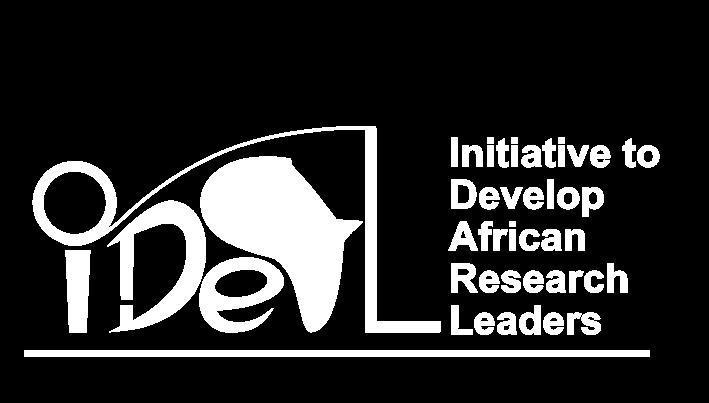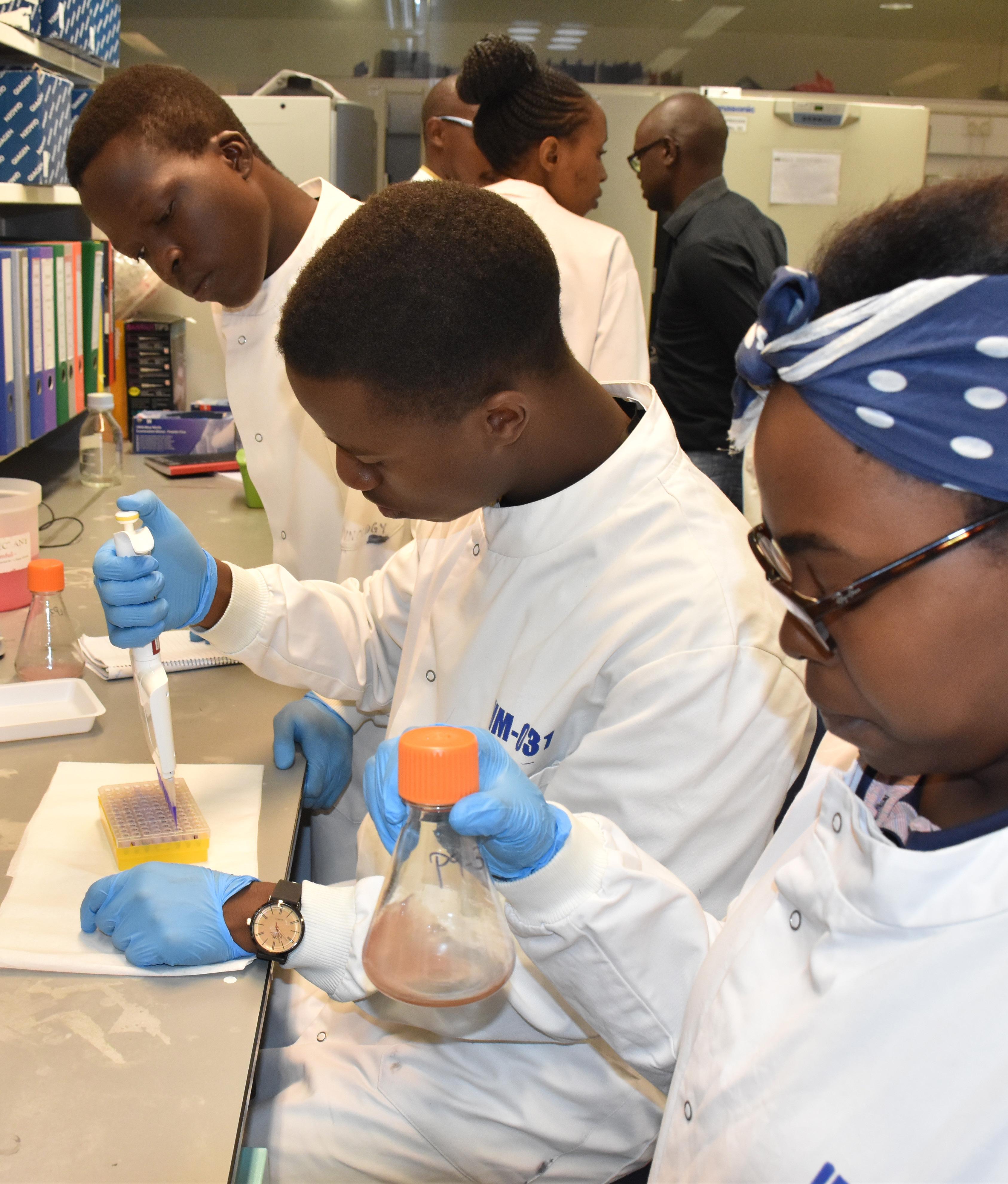
8 minute read
10th Cohort of School Leavers Attachee Complete Attachment

The 10th Cohort of School Leavers Completes Attachment T he 10th cohort of the KEMRI School Leavers Attachment Scheme (SLAS) completed their annual attachment. The students joined the scheme on 13th March 2019 and left on 31st May 2019. During the attachment, the students went around the 5 KEMRI-Wellcome Trust Departments on fortnightly rotations. The scheme was advertised through various online and offline platforms attracting a total of over 90 applicants. More than 90 eligible students were invited for an open day, after which 28 were invited for face-to-face interviews. Nine students went through the competitive process successfully. So far 80 students have gone through the scheme successfully. The KEMRI School Leavers Attachment Scheme is aimed at giving Kilifi’s very talented students a taste of research whilst attracting more young people to research aiming to generate a critical mass of African research leaders.
Advertisement

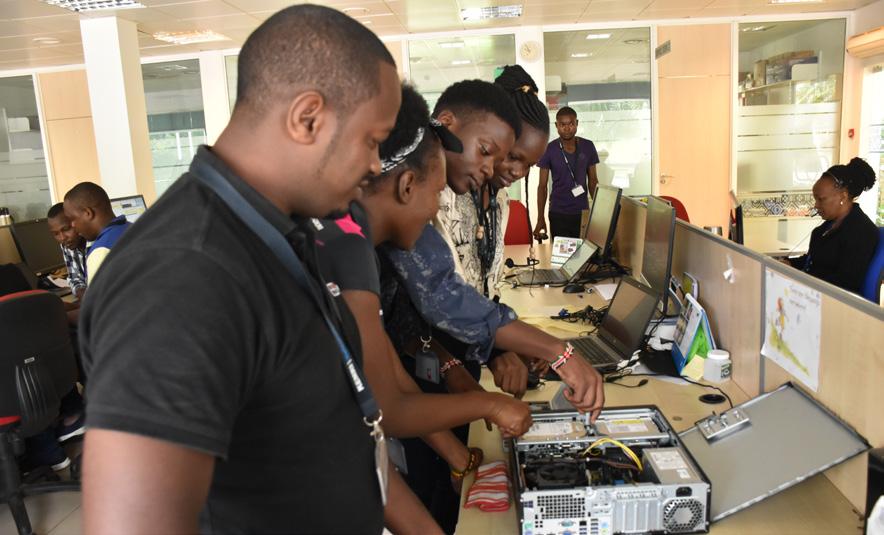
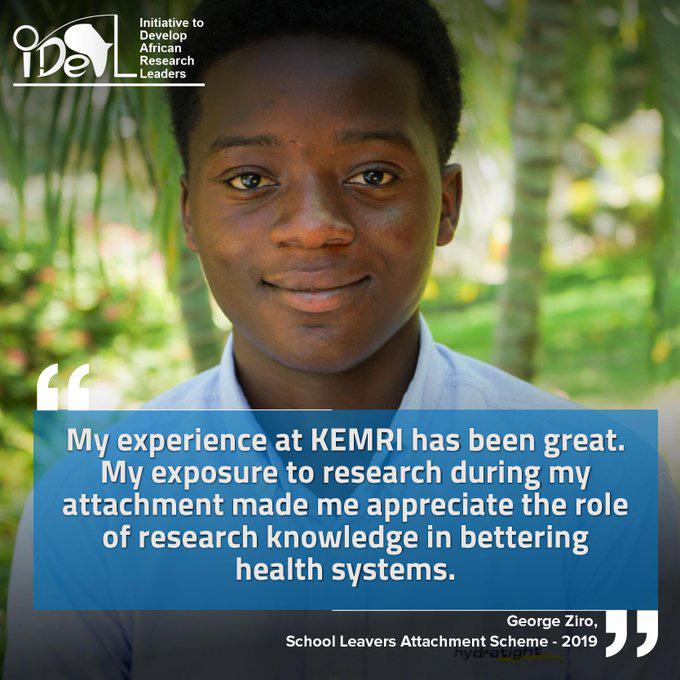
George Ziro, one of the 2019 School Leavers Attachment Scheme (SLAS) attaches was selected to participate in The London International Youth Science Forum (LIYSF). LIYSF is a two-week residential student event held at Imperial College London and The Royal Geographical Society. The event features lecture demonstrations from leading scientists, visits to world-class laboratories and universities combined with cultural interaction, with 500 students aged 16-21 years old from 70 countries. This year’s conference was held from the 24th July – 7th August 2019. Attache Participates in The London International Youth Science Forum (LIYSF)

3rd Masters Cohort Completes Studentship
Faith Marura “At IDeAL, I got trained, mentored and exposed to a lot of opportunities in scientific research and research leadership. I interacted with scientists within the Programme and learnt a lot from them,” says Faith Marura, a master’s student from the University of Nairobi.
Her project is working on the discovery of antigens that have a potential of being vaccine candidates. “If we develop an effective malaria vaccine we will reduce the number of malaria deaths which will help improve the economy of malariaendemic countries,” she narrates.
Brian Roy Omondi “A healthy Africa is a prosperous Africa!” quotes Brian Roy Omondi, a master’s student from Egerton University, who observes that this was his drive to pursue Biochemistry. For his Master’s project, he sought to understand naturally acquired malaria transmissionblocking immunity to fast track the development of malaria blocking vaccines that will help lower malaria transmission. His research could aid in achieving the 90% reduction in mortality and morbidity arising from the disease.
Andrew Egesa Andrew is interested in better management of infectious diseases using biotechnological tools. During his studentship, he investigated the performance characteristics of molecular diagnostics of respiratory viruses. The findings will be key in the surveillance and management of these pathogens.
His research is geared toward improving the surveillance of respiratory viruses in humans.
Everline Onyango After her cousin who worked in an HIV research lab inspired her, Everline pursued Biochemistry for her Undergraduate and Microbiology at Pwani University for her Masters.
She has been exploring the one way through which malaria parasites and the human host interact, enhancing the severity of malaria.
Everline observes that “This was a very good platform to kick-start my career as a researcher. I have gained a lot of scientific skills, effective communication, and the importance of building networks.”
Caroline Mburu Caroline’s love for mathematics and a drive for a healthy nation sparked her interest in using statistical and mathematical analytical tools in disease prevention and management. This was her inspiration to pursue a Master’s in Medical Statistics at the University of Nairobi.
“This master’s studentship has helped me understand the evidence required to impact vaccine introduction in a country. It has enabled me to learn the use of mathematical modelling skills in infectious disease control,” she remarks.
Her research project is on the costeffectiveness of introducing a typhoid conjugate vaccine in Kenya. The results achieved will guide the introduction of a vaccine that will cause the eradication of typhoid.
Arnold Lambisia “I remember being introduced to my KEMRI-Wellcome Trust supervisors for the first time. I expected to meet some stern and serious faces but alas! They were very friendly and welcoming,” recalls Arnold Lambisia.
Arnold is pursuing a Master’s in Molecular Biology and Bioinformatics at the Jomo Kenyatta University of Agriculture and Technology (JKUAT), driven by his curiosity on the human biology subject. He wanted
Faith Marura
Brian Roy Omondi
Caroline Mburu Peninah Makusa
John Mutiso
Andrew Egesa
Everline Onyango
Arnold Lambisia
Jacqueline Wahura Samuel Nyamweya
to understand how bioinformatics tools are used to analyse big data and be able to answer questions on infectious diseases in their biological, environmental and social contexts. His master’s project is investigating viral and diarrhoea aetiology.
“As I step out into the research field and strive to be a research leader in Africa and Globally I feel confident as my studentship at IDeAL has horned my scientific skills, I have received mentorship from top research scientists who have paved the way ahead for me,” remarks Arnold.
Peninah Makusa “What I find interesting about science is that it allows the discovery and exploration of new ideas. I have always wanted to delve deeper into this field as I believe it holds the key towards improved quality of life,” says Peninah Makusa who is pursuing Master of Science in Biotechnology at the University of Nairobi.
Her project is on ‘Antibody response to Malaria parasite in an infected and recovering cohort of children in Kilifi, Kenya.’ The project aims to look at antibody responses to parasite antigens at acute disease and during the recovery period to see if the magnitude of antibody responses to the antigen subtypes change over time. The project will inform the development of a more efficacious vaccine against malaria.
John Mutiso John is pursuing a Master of Science in Medical Statistics at the University of Nairobi hoping to become a research leader in Africa. His master’s project is geared towards developing a data analysis framework that removes technical variance in data got from high throughput tools used in investigating immunity. The tool can be used to pre-determine targets of vaccine development, hence a successful step towards the fight against infectious diseases.
“Ten months at IDeAL and I am better in the application of my speciality in research. I’m motivated and have learned a lot, not only in academics and research but also, interacted with great people,” says John.
Jacqueline Wahura Jacqueline is pursuing MSc. Molecular Biology and Bioinformatics. Her project is on the whole-genome sequencing of the Respiratory Syncytial Virus (RSV) using the long-read technology, intending to develop a sequencing protocol for sequencing respiratory viruses using this technology.
The overall aim of the project is to use the technology to understand the transmission patterns of respiratory viruses, intending to guide the development of management interventions.
Samuel Nyamweya Samuel, a master’s student at Jaramogi Oginga Odinga University, is researching on health systems, examining the career choices and pathways of graduate nurses trained in semi-urban settings. His project focuses on addressing Human Resource for Health (HRH) challenges in Low Middle-Income Countries and ways of scaling up Universal Health Care.
Samuel has enjoyed his 10-month studentship and further adds, “My experience at IDeAL influenced my perspective regarding health systems research. I am now more determined, more focused with more energy to advance my career in health systems research to enable me to contribute towards strengthening health systems in Kenya.”
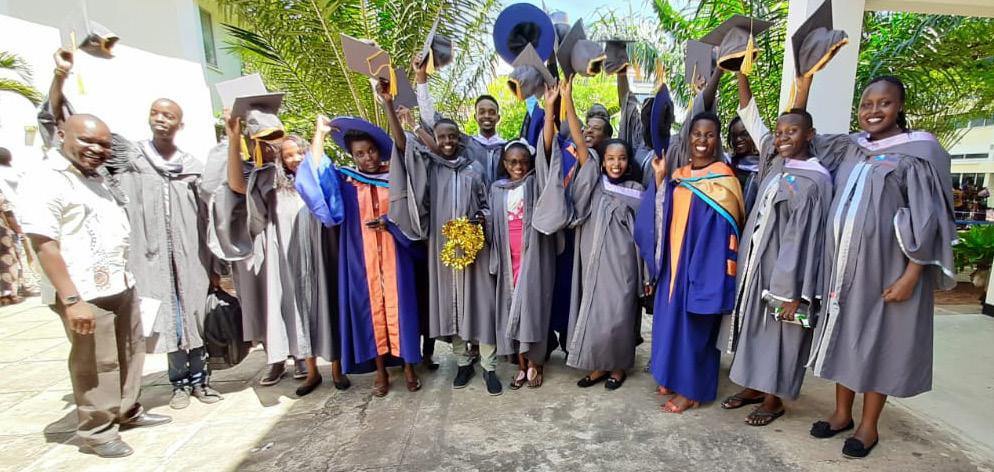
25 IDeAL PGD Fellows Graduate
It was all pomp and celebration as 25 IDeAL Postgraduate Diploma students graduated during the 7th Pwani University graduation ceremony held in Kilifi. The fellows who started their studentship in September 2018 were registered at Pwani University undertaking a Postgraduate Diploma in Health Research Methods. The course, jointly offered by KEMRI-Wellcome Trust and Pwani University is now on its fourth cohort having trained 85 fellows with a 100% success rate.
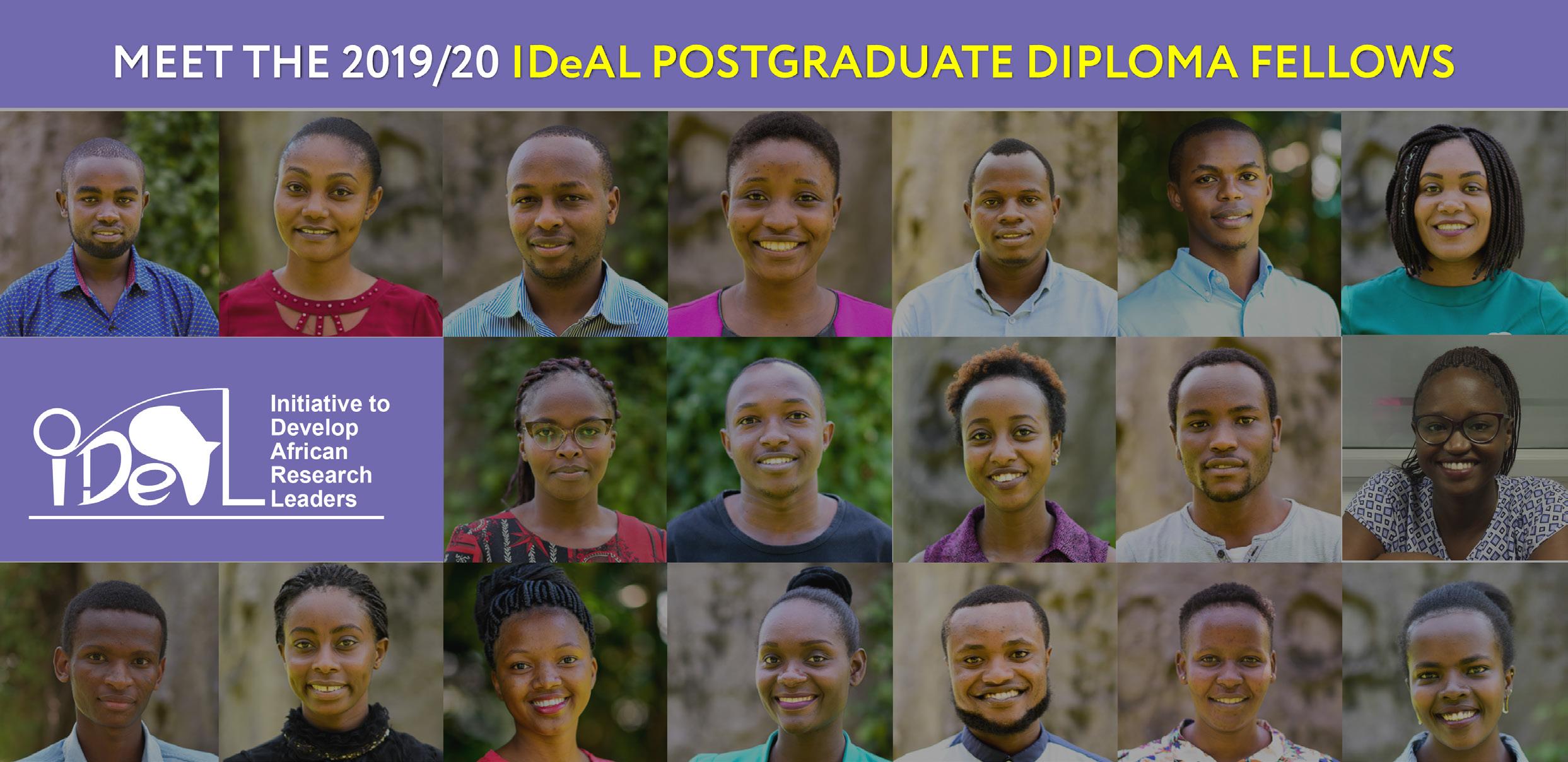
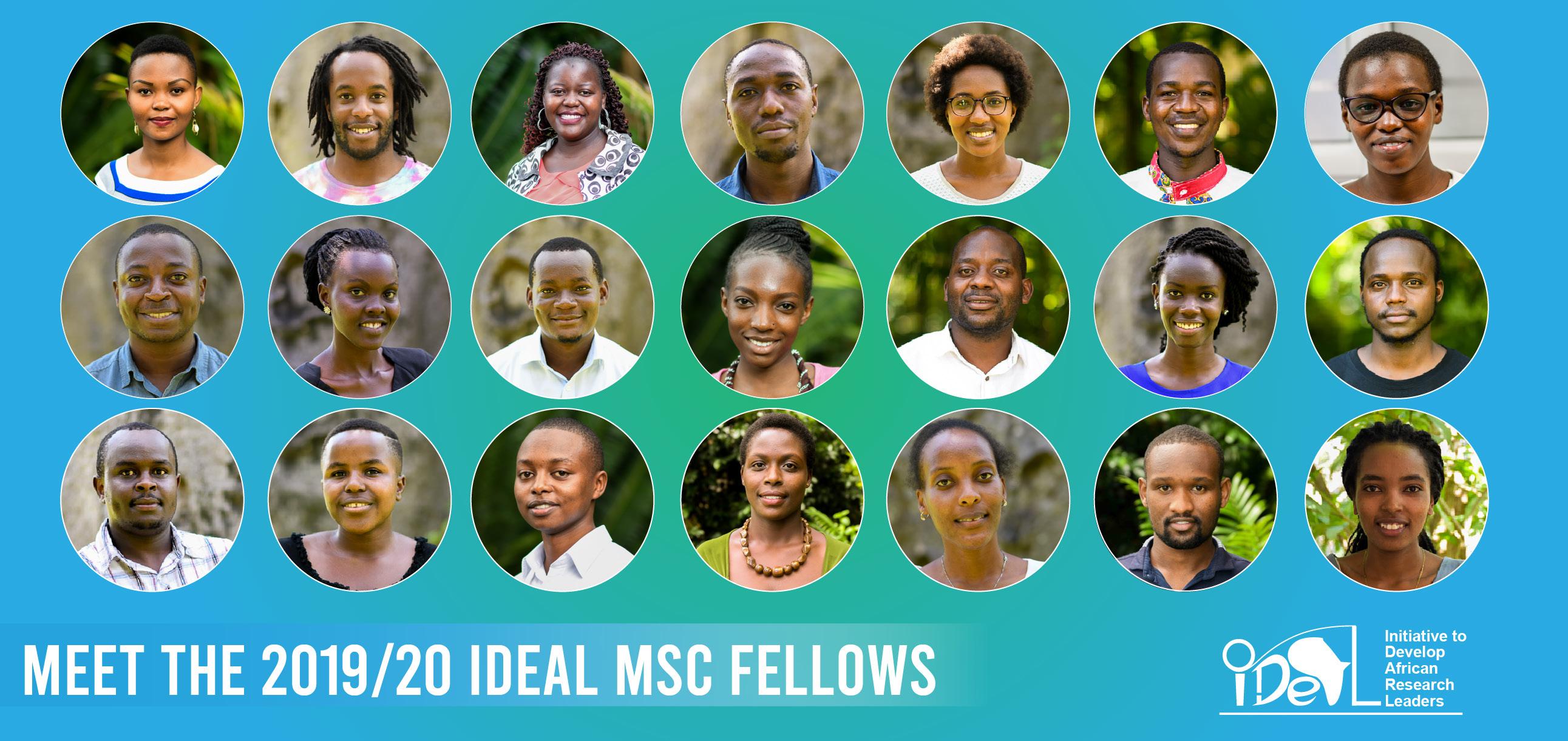
Atotal of 21 MSc students joined us in 2019 making the fourth MSc Cohort. The fellows are undertaking various masters programmes including immunology and bioinformatics.
In line with our mandate and commitment to churn a critical mass of African research leaders, our Masters Studentship Scheme seeks to support talented students registered at local universities complete their research project training component as well as support the students to pursue taught courses at Pwani University. Over the last 4 years, we have enrolled 84 students in our different training schemes, 60 of whom have completed their training.
Whilst we take pride in this great achievement, our emphasis goes beyond numbers. We are keen to see a large proportion of our students transition to the next level on the research career ladder.
The Postgraduate Diploma Course in Health Research Methods offered jointly with KEMRI – Wellcome Trust Research Programme and Pwani University is a unique learning opportunity that equips recent graduates with theoretical and practical knowledge on the philosophy and practice of research to enhance their transition into a research career or further postgraduate training. The course covers all types of health research from basic biomedical research to social sciences and health system research and provides an opportunity for the students to develop a deep appreciation of the various elements of research through the attachment undertaken in an active research environment. In 2019, 19 young graduates joined the program working on various projects.
